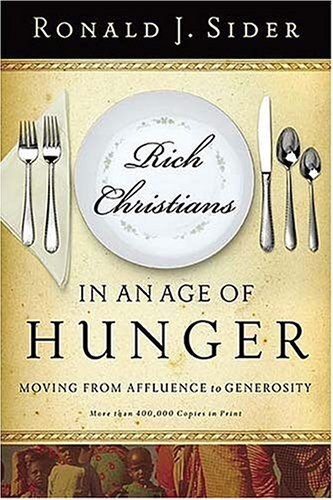Ronald J. Sider, Rich Christians in an Age of Hunger: Moving from Affluence to Generosity. Thomas Nelson, 2005.
Companion volume: The Scandal of the Evangelical Conscience, Why Are Christians Living Just Like the Rest of the World? (2000)
Referenced in:
- Giving and Financial Stewardship, Christian Social Conscience Regarding Possessions
- Ron Sider on Social Ministry
- Theological and Philosophical Foundations of Social Ministry
LifeandLeadership.com Summary
This book has had an almost seismic effect on the evangelical social conscience since its first printing in 1977 (now in its third revision). Sider, president of Evangelicals for Social Action, has led the effort to stretch conservative evangelicals to understand the gospel beyond the “individual salvation of the soul” to a more holistic liberation of body and soul, and a consequent concern for social and economic justice.
He opens the book by presenting startling statistics about world poverty and the huge disparity between the “haves” and the “have-nots,” confronting the tendency of the “affluent minority” to rationalize their wealth. This is followed by several chapters of serious biblical study highlighting God’s identification with the poor and the “casting down” of the rich. There is a survey of Old and New Testament economics with emphasis on the year of jubilee, sabbatical year, tithing and giving, the new community of Jesus, and the practice of economic koinonia. Of special interest is his chapter, “Social Evil: Sin Embedded in Societal Systems,” which expands upon scriptures clear condemnation of structural evil and injustice. This leads to the third part of the book which seeks to help evangelicals appreciate the many causes of poverty which go well beyond the standard conservative explanation that the poor are that way by personal choice and irresponsible living. He mentions factors such as unbiblical worldviews, disasters, lack of technology, Western colonialism, and presents an entire chapter on various forms of structural injustice. Part four deals with implementation, first on the individual scale, and then broadening to practices of Christian community and finally to how we may influence the world economy. Here Sider suggests practices such as the graduated tithe, i.e. begin with a tithe and then increase the percentage as God increases one’s annual provisions. He discusses communal living and lifestyle implications of the Sabbath principle, and describes the “triple five plan” (p. 217) wherein churches lead by example in helping the poor and challenge governmental systems to do the same.
Sider indeed advocates a particular point of view. Do not expect a cautious, academic, objective look at poverty and wealth, but instead a prophetic and convicting call of the rich away from their smug comfort into a life of sharing their wealth. While Sider probably does not intend it, it is difficult to come away from this book without believing that wealth is inherently bad. Jim Wallis is more balanced in that dimension. A counter to Sider that is friendlier to wealth is John R. Schneider, The Good of Affluence: Seeking God in a Culture of Wealth. It is probably wise to supplement both Sider and Schneider with objective treatments of the subject such as Blomberg’s Neither Poverty Nor Riches, while not distancing oneself too far from Sider’s or Wallis’ activist tenor. Sider has also written an interesting companion volume, The Scandal of the Evangelical Conscience, Why Are Christians Living Just Like the Rest of the World? (2000) which asserts that “by their daily activity, most ‘Christians’ regularly commit treason. With their mouths they claim that Jesus is their Lord, but with their actions they demonstrate their allegiance to money, sex, and personal self-fulfillment.” He notes this in areas such as hedonism, materialism, racism, egotism, and many other undesirable traits are commonplace.
From the Publisher
Do you want to make a true difference in the world? Dr. Ron Sider does. He has, since before he first published Rich Christians in an Age of Hunger in 1978. Despite a dramatic reduction in world hunger since then, 34,000 children still die daily of starvation and preventable disease, and 1.3 billion people, worldwide, remain in abject poverty. So, the professor of theology went back to re-examine the issues by twenty-first century standards. Finding that Conservatives blame morally reprehensible individual choices, and Liberals blame constrictive social and economic policy, Dr. Sider finds himself agreeing with both sides. In this new look at an age-old problem, he offers not only a detailed explanation of the causes, but also a comprehensive series of practical solutions, in the hopes that Christians like him will choose to make a difference.
About the Author
Ronald J. Sider (Ph.D., Yale) is Professor of Theology, Holistic Ministry and Public Policy and Director of the Sider Center on Ministry and Public Policy at Palmer Theological Seminary and President of Evangelicals for Social Action. A widely known evangelical speaker and writer, Sider has spoken on six continents, published thirty-one books and scores of articles.
***For additional information on this resource, including reviews, click the bookstore links. Check the reference at page top or the links below for resource guides on related topics.***
Related Areas
See Other Resource Guides on Christian Social Ministry:
- Theological and Philosophical Foundations of Social Ministry
- Spirituality for Ministry of Social Compassion and Justice
- Strategies For Christian Social Ministry
- Perspectives and Strategies For Social Ministry Among the Urban Poor, Urban Ministry
- Christian Perspectives on Political Theory and Church-State Relations
- Christian Perspectives on Economics and Public Policy


